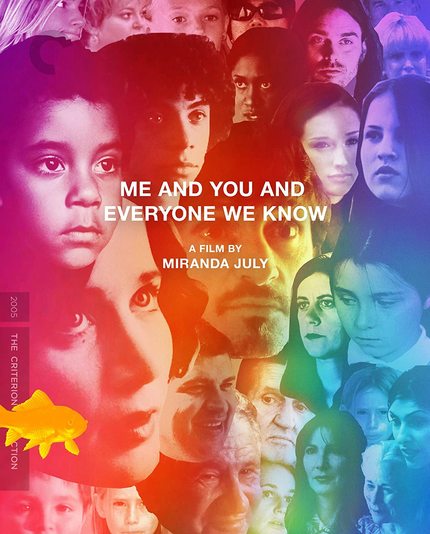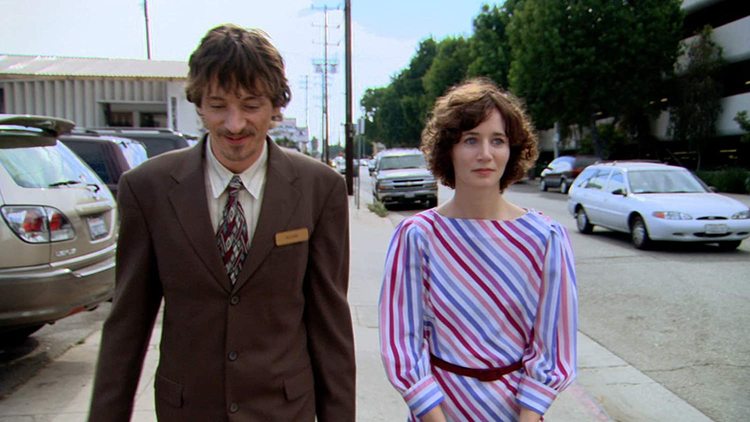Blu-ray Review: Criterion Welcomes ME AND YOU AND EVERYONE WE KNOW
Miranda July directs John Hawkes in her vibrantly melancholy debut film. ))<>((

As everything is going wonky in the world, it’s only fitting that July is early this year. Even more fitting that it’s not the month, but the filmmaking lady, Miranda July.
It bears celebrating that quite recently this past spring, July, a unique filmmaker, novelist, and all/around multifaceted artist, shepherded her unforgettable first feature, Me and You and Everyone We Know, to Blu-ray as a definitive Criterion edition. Not only does it contain the first high-definition release of her award-collecting 2005 film, it also serves as an excellent career retrospective up to (and in few cases, beyond) that time.
Humbly displaying its lovingly controlled thrift store aesthetic as July’s off-kilter ensemble long for connection in her contemporary average-ville, Me and You and Everyone We Know is unquestionably the work of one of the early twenty-first century’s most noteworthy artists. With no bad scenes, the movie makes itself hard to walk away from even as its characters long at times to do just that with each other, with their lives. It manages to be perfectly esoteric without a hint of pretension. There’s far too much pure passion and heart at the core of it for that. Even the odd-duck score by Michael Andrews, existing in a place between nursing-home organ music and trance electrontica, is spot-on.
July, starring in her own film (as she also did with her 2011 follow-up, The Future) as the struggling artist Christine Jesperson, claims that of all the characters in the movie, hers is the least like her true self. John Hawkes, already well established in 2005 as an actor if not yet famous, plays Richard Swersey, a shoe-store salesman and father of two boys who’s so torn up by his pending separation that he lights his own hand on fire in front of his two sons. Actually, it’s a magic trick gone wrong. But the action is traumatic and weird nonetheless for all parties involved. He wears a fat bandage over his hand for the rest of the movie.
It’s only fitting that in a film lovingly titled with what some would consider too many words the main characters names do not roll off the tongue. “Swersey”... “Jesperson”... These are the people in your neighborhood. The awkward people in an awkwardly beautiful world. Arriving at that beauty- or any piece of it- will prove to be their grand challenge of the story.
For Christine, an artist whose radiance is hampered by her legitimate frustration with everyone’s tendency to look passed her, the struggle is to simply be noticed. If not noticed, then valued. Better yet, how about noticed and valued? Not necessarily in any professional sense, but in ways meaningful and personal. Although in a professional sense would also be great.
Christine’s attempts to hand-deliver a VHS tape of her performance art to the local Museum of Contemporary Art is harshly dismissed, despite the many bright pink round stickers she’s decorated it with. (An apt barb at the institutionalized art world). When Christine gets into her car, she habitually presses three such stickers that are a fixed to her dashboard. Whatever magical activation this OCD routine triggers is obviously hit and miss. But July is of course perfect for this part (which she made up). Her fragile, intuitive eyes contain multitudes in any case; here, the multitudes live out.
One key thing we learn about July from the Blu-ray’s many bonus features is that she is a disciplined artist, careful to operate within her own prescribed rules. (See the featurette on her recent Artangel multi-faith thrift store project). She establishes and sticks to her “style guide”, detailing parameters of color, fashion, and props. It is her template and goes to show the degree to which she was thinking like a bona-fide filmmaker here, with her very first feature.
Within the film, one of the characters prominently has a style guide of her own. The self-serious yet terribly insecure grade schoolgirl Sylvie (Carlie Westerman) obsessively cuts out advertising images of appliances and silverware and whatnot to affix to an already-accomplished scrapbook of hope chest items. She is singularly focused about ensuring her own future, having it already planned down to her non-existent breakfast nook aesthetic.
Sylvie has an unlikely and thankfully innocent friendship with Peter Swersey (Miles Thompson), the ineffectual oldest son of lead character Richard. Sylvie’s laser-focused seriousness in mapping particular details of her life seems to intrigue Peter, who’s own life is in the midst of being uncontrollably throttled by his parents’ breakup. Peter, biracial and outwardly ineffectual, is stalked then taunted by a pair of local girls his own age before that acquaintance takes yet another turn.
Back home, Peter shares a bedroom with his much younger brother, Robby (Brandon Ratcliff). They have a lava lamp in their bedroom that’s never turned on. And there’s just something a little sad about a lava lamp that’s not on. They also have an older computer, and this being 2005, it must hijack the phone line to access the internet. Peter likes to cruise chat rooms, flirting with unknown strangers that are presumably women. When little Robby gets involved in one of the chats, the body-talkin’ exchange takes an uncomfortable turn towards the scatological. Thus, this emoticon symbol was born, meaning “back and forth, forever”: ))<>((
July’s short film work, some of which is included as supplemental material on this disc, reiterates what’s apparent in the feature: her world-building is wholly immersive even as it’s all about connection. Esoteric and detached at times (though not the feature), July in these films is never not acting. Her living and operating in her own world yields some mostly interesting results. It is a body of work rooted in pure feminism, meaning work that isn’t merely rah-rah empowering so much as unfiltered, honest, raw, tortured, and vulnerable. And through all of that, at that time and in that moment, it loops back around to true empowerment.
⁃ High-definition digital master, approved by director Miranda July, with 5.1 surround DTS-HD Master Audio soundtrack
⁃ New documentary about July’s artistic beginnings and the development of her debut feature. In it, she is interviewed by fellow filmmaker/actress Lena Dunham, who makes the following observation regarding one of film’s female character’s online flirtation with someone she doesn’t know to actually be an innocent kid: “Grown women projecting all her relational needs onto a child- which is what women do in relationships all the time.” Well that sure oughta go over well on faux-macho Reddit. More power to her.
⁃ Open to the World, is a new documentary by July about the 2017 interfaith charity shop and participatory artwork she created in collaboration with Artangel
⁃ July Interviews July: Deauville, 2005, a discovery from July’s archives, newly edited
⁃ Six scenes from the 2003 Sundance Directors Lab, where July workshopped the film, with commentary by July
⁃ short films by July:
The Amateurist (1998)
Nest of Tens (2000)
⁃ Several films from July’s “Joanie 4 Jackie” project, and a documentary about her grassroots years-long program to promote and encourage independent female filmmakers. Some very solid and interesting stuff hiding in here!
⁃ The film’s trailer
⁃ PLUS: A nice, fat pink booklet with essays by artist and scholar Sara Magenheimer and novelist Lauren Groff.
July, who’s third film, Kajillionaire, is the expected in September of this year, may not be a cinephile (she says she’s not), but she inherently knows her way around visual storytelling- even when the story is peculiar. Lena Dunham, in their video chat, also accurately observes that Me and You and Everyone We Know is just traditional enough in terms of its rom-com tropes to satisfy an ordinary filmgoer while also weird enough to attract weirdos.
The film is a more-than ideal choice as Criterion makes a noticeable and concerted effort to include more female directors in the collection. The disc, so loaded with sub-menus upon sub-menus of content, is a keeper. The cover isn’t the greatest, but we’ll give that a pass. It didn’t come out in July, but again July comes out a winner. And by extension, so do we.








